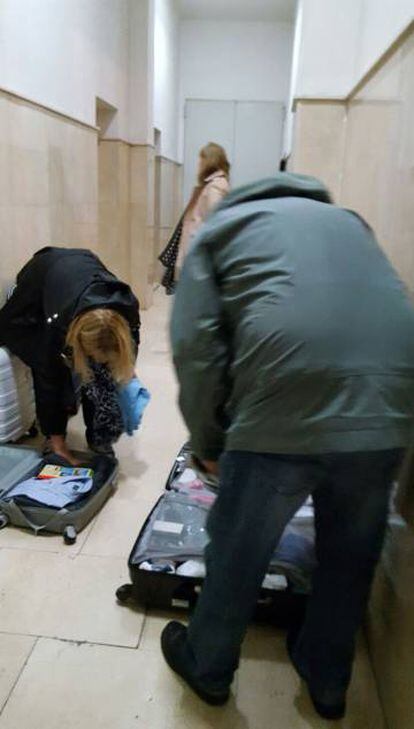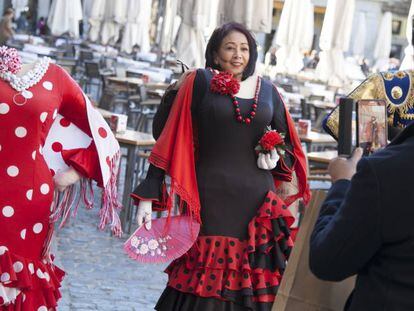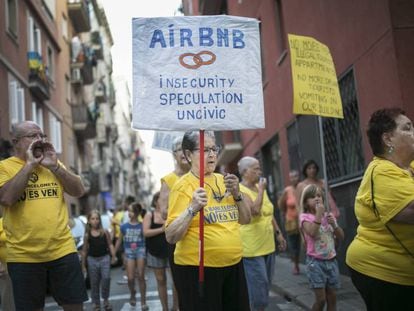When a residential apartment in Madrid turns into a tourist nightmare
The long-term residents in a central block of flats have had enough of the constant stream of visitors

Noise in the middle of the night, every night, trash everywhere, crowded hallways and pools of vomit are just some of the inconveniences facing the neighbors at number 15 Príncipe street, near the central Puerta del Sol. Since 2014, around 80% of this building of 42 apartments have been rented out to tourists by L&H apartments, otherwise known as Like Home Madrid.
There are only three permanent residents in the building, who complain they are living to all intents and purposes in a hotel, though the only concession to this fact is a small sticker on the intercom. They have filed complaints with the regional government, with the company that rents the apartments and with the central Madrid City Hall counselor, Jorge García Castaño, but little has changed. As far as L&H apartments are concerned, their business is “completely legal.” End of story.
Half of Spain must have a key. You never know who you’re going to meet when you enter the building
Resident Luis García
“Where’s the guarantee of security in the building?” asks Luis García, who lives on the third floor.
García bought his flat in 1994 and has been living there since 2005. But he is clearly worried by the fact that there is a never-ending stream of complete strangers coming and going from his building, each with their own set of keys. “Half of Spain must have a key,” he says. “There are 40 apartments that are rented out twice a week, which means 80 sets of keys a week. You never know who you’re going to meet when you enter the building.”

According to García, one of the worst episodes involved 15 girls setting up a huge inflatable swimming pool on the terrace one summer. “They spent the night drinking beer and dancing. One of the neighbors gave them hell, but it made no difference.”
Another was when he told a member of L&H’s staff not to smoke in the entrance to the building. “I told him it was forbidden and he got aggressive,” says García. “I took photos of him and he told me that if I did anything with them, he would kill me. Luckily, I reported him and won the court case.”
María Jesús Penit is another permanent resident who has lived on the third floor for the past six years. She explains that one solution suggested by the authorities involved setting up three security cameras in the entrance hall, but this was not effective. “When someone came in, the cameras didn’t pick them up until they were way down the hall,” she says. “We still come across drunk people when we come home or young people who have simply dumped their cases in the entrance hall while they wait for someone from the rental company to meet them.”
Penit says once she came home at 5pm and was met by drunk football fans pouring out of the building. She then found empty bottles and a syringe in the passageway. The situation only gets worse in summer, she says. “Last year I put in air-conditioning so I could close the windows because from Monday to Sunday people wake you up at 3am partying,” she says. “Each apartment looks out onto a central courtyard and I live high up so the noise is non-stop,” she says. “But it doesn’t matter what you say, the rental company does nothing to solve the problem.”
If something happens, there’s no one to take charge. This is in fact a hotel but it’s not recognized as such
L&H apartments refuse to comment apart from saying that the business is “completely legal.” According to García and Penit, the company’s responsibility appears to begin and end with handing over the keys to the guests. “There is usually somebody in reception until 8pm and then there’s no one until the next day,” says Penit. “If something happens in the middle of the night, there’s no one to take charge. This is in fact a hotel but it’s not recognized as such.”
According to García, when he and Penit approached Madrid City Hall counselor Jorge García Castaño, he was surprised by the seriousness of the problem. “He said it was the only building he knew of that was 80% occupied by tourists but had local residents living there too,” says García.
García Castaño promised that he would send the fire department to make a report and check out that the building was fit for so much tourist traffic. “None of the earnings from this are declared to the authorities,” says García, who is sick of living in a hotel that lacks any hotel facilities.
English version by Heather Galloway.












































